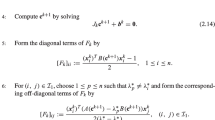Abstract
Inverse spectral problems are studied for second order integral and integro-differential operators. Uniqueness results are obtained, and algorithms for the solutions are provided along with necessary and sufficient conditions for the solvability of these nonlinear inverse problems.
Similar content being viewed by others
References
Marchenko, V.A.: Sturm–Liouville operators and their applications. Naukova Dumka, Kiev, 1977; English transl., Birkhäuser (1986)
Levitan, B.M.: Inverse Sturm–Liouville problems. Nauka, Moscow (1984); English transl., VNU Sci. Press, Utrecht (1987)
Freiling, G., Yurko, V.A.: Inverse Sturm–Liouville Problems and Their Applications. NOVA Science Publishers, New York (2001)
Beals, R., Deift, P., Tomei, C.: Direct and Inverse Scattering on the Line, Math. Surveys and Monographs, vol. 28. Amer. Math. Soc., Providence (1988)
Yurko, V.A.: Method of Spectral Mappings in the Inverse Problem Theory. Inverse and Ill-Posed Problems Series. VSP, Utrecht (2002)
Yurko, V.A.: Inverse Spectral Problems for Differential Operators and Their Applications. Gordon and Breach, Amsterdam (2000)
Lakshmikantham, V., Rama Mohana Rao, M.: Theory of Integro-Differential Equations. Stability and Control: Theory and Applications, vol. 1. Gordon and Breach, Singapure (1995)
Yurko, V.A.: An inverse problem for integral operators. Matem. Zametki 37(5), 690–701 (1985) (in Russian); English transl. in Mathematical Notes 37(5–6), 378–385 (1985)
Yurko, V.A.: An inverse problem for integro-differential operators. Matem. Zametki 50(5), 134–146 (1991) (in Russian); English transl. in Math. Notes 50(5–6), 1188–1197 (1991)
Buterin, S.A.: The inverse spectral problem of the reconstruction of a convolution operator perturbed by a one-dimensional operator. Mat. Zametki 80(5), 668–682 (2006) (in Russian); translation in Math. Notes 80(5), 631–644 (2006)
Buterin, S.A.: The inverse problem of recovering the Volterra convolution operator from the incomplete spectrum of its rank-one perturbation. Inverse Prob. 22, 2223–2236 (2006)
Buterin, S.A.: On an inverse spectral problem for a convolution integro-differential operator. RM 50, 173–181 (2007)
Kuryshova, Yu., Shieh, C.-T.: An inverse nodal problem for integro-differential operators. J. Inverse Ill-Posed Problems 18(4), 357–369 (2010)
Kuryshova, Yu.: An inverse spectral problem for differential operators with integral delay. Tamkang J. Math. 42(3), 295–303 (2011)
Buterin, S.A.: On the reconstruction of a convolution perturbation of the Sturm–Liouville operator from the spectrum. Diff. Uravn. 46(1), 146–149 (2010) (in Russian); translation in Diff. Eqns. 46(1), 150–154 (2010)
Wang, Y., Wei, G.: The uniqueness for Sturm–Liouville problems with aftereffect. Acta Math. Sci. 32A(6), 1171–1178 (2012)
Buterin, S.A.: On inverse spectral problems for first-order integro-differential operators with discontinuities. Appl. Math. Lett. 78, 65–71 (2018)
Acknowledgements
This work was supported by Grant 17-11-01193 of the Russian Science Foundation.
Author information
Authors and Affiliations
Corresponding author
Ethics declarations
Conflict of interest
The authors declare that they have no conflict of interest.
Appendix
Appendix
Let the function \(y(x)=S(x,\lambda )\) be the solution of the equation
under the initial conditions \(S(0,\lambda )=0,\; S'(0,\lambda )=1\). Then \(S(x,\lambda )\) is the solution of the integral equation
Since
then (4.1) can be written as follows:
Solving this equation by the method of successive approximations, we get
and consequently,
where
This yields
where
and the series converges absolutely and uniformly for \(0\le \xi \le x\le \pi \).
Rights and permissions
About this article
Cite this article
Buterin, S., Yurko, V. Inverse problems for second order integral and integro-differential operators. Anal.Math.Phys. 9, 555–564 (2019). https://doi.org/10.1007/s13324-018-0217-9
Received:
Revised:
Accepted:
Published:
Issue Date:
DOI: https://doi.org/10.1007/s13324-018-0217-9
Keywords
- Integral and integro-differential operators
- Inverse spectral problems
- Algorithms
- Characterization of spectral data



